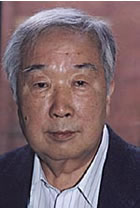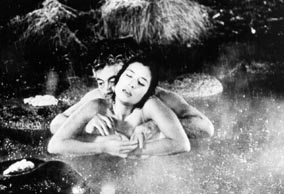Shohei Imamura 1926 - 2006
 Not to cheapen what is a very sad day, but I have this habit of "killing" filmmakers, as well as anyone toiling away in the cinemaworld. Back in 1999, I picked up a DVD of 2001: A Space Odyssey; the next morning, I awoke to hear that Stanley Kubrick had just died. When visiting Manhattan in September 2001, I made a joke at Pauline Kael's expense; the next day, she had passed away. And on 05 June 05 (as my records go), I put in my air conditioner after the stifling heat and resulting delirium left me hopelessly lost during Shohei Imamura's antic, twisted 1966 comedy The Pornographers. Last night, I decided to put my A/C in a couple days earlier than last year (aside: holy hell did the East Coast suddenly get goddam hot); this morning, I discovered Imamura has died. Coincidence?
Not to cheapen what is a very sad day, but I have this habit of "killing" filmmakers, as well as anyone toiling away in the cinemaworld. Back in 1999, I picked up a DVD of 2001: A Space Odyssey; the next morning, I awoke to hear that Stanley Kubrick had just died. When visiting Manhattan in September 2001, I made a joke at Pauline Kael's expense; the next day, she had passed away. And on 05 June 05 (as my records go), I put in my air conditioner after the stifling heat and resulting delirium left me hopelessly lost during Shohei Imamura's antic, twisted 1966 comedy The Pornographers. Last night, I decided to put my A/C in a couple days earlier than last year (aside: holy hell did the East Coast suddenly get goddam hot); this morning, I discovered Imamura has died. Coincidence?Well, yes, obviously. But the thing is, I don't really have much to say about Imamura, a filmmaker whom I've seen fairly little of, and whose work I didn't initally get. When I saw his 1997 Palme d'Or-grabber The Eel, I was mostly at a loss to his endless tonal switches, which leapt from opaque tragedy to wacky slapstick with even less transitional wiggle room than Arnaud Desplechin. That may be why it took me three years to get around to my next Imamura, the aformentioned The Pornographers -- though that may just be because I've somehow managed to mostly avoid classic Japanese cinema during my various trips through history. Like many before me, I loaded up on the far more available (and far more Western) Kurosawa, cherry picked from Ozu, Mizoguchi and Suzuki, and left many to be either briefly dealt with or deemed total blank spots on my (nonetheless immense) films-seen list. (Along with Imamura, this would include such luminaries as Oshima, Ichikawa, Kobayashi, Fukasaku, Teshigahara and Gosha.) I've semi-recently tried to correct that, if without much direction; it's weird that I've seen as many Naruses as I have Ozus.
 That's Ed, having since "gotten" Imamura -- courtesy 1989's beautifully grotesque post-Hiroshima portrait Black Rain (turn to your right) -- I can't wait to dig deeper into his filmography. A former clapper boy for Ozu, Imamura grew up to make films in diametric opposition to his former employer, defying the filmmaker's languid, bottomless humanism in favor of, well, manic, bottomless misanthropy. Or so goes the cliché. In fact, the Japanese New Waver's films -- again, from what I've seen -- trade in a worldview that, unlike other cinematic pessimists, is more amused than emboldened by the ridiculousness of the homo sapien set. Like the best filmmakers, his viewpoint and specific tone are hard to shake off even days after the movie's over. Ryan Wu, who went so far as to name his blog after an obscure and awesomely-named 1961 Imamura, dubbed him a zoologist; I can do no better.
That's Ed, having since "gotten" Imamura -- courtesy 1989's beautifully grotesque post-Hiroshima portrait Black Rain (turn to your right) -- I can't wait to dig deeper into his filmography. A former clapper boy for Ozu, Imamura grew up to make films in diametric opposition to his former employer, defying the filmmaker's languid, bottomless humanism in favor of, well, manic, bottomless misanthropy. Or so goes the cliché. In fact, the Japanese New Waver's films -- again, from what I've seen -- trade in a worldview that, unlike other cinematic pessimists, is more amused than emboldened by the ridiculousness of the homo sapien set. Like the best filmmakers, his viewpoint and specific tone are hard to shake off even days after the movie's over. Ryan Wu, who went so far as to name his blog after an obscure and awesomely-named 1961 Imamura, dubbed him a zoologist; I can do no better.Then, of course, there's his technical chops, which are beyond formidable. Even if my heat-induced self couldn't make heads or tails of The Pornographers' constantly shifting plot(s), there's no state of consciousness in which I wouldn't be salivating at his 'scope B&W. Here's one of my favorite images from the film (plucked from Herr Filmbrain):

Surprisingly, this shot -- with its curious framing, subtly pronounced shades of B&W and, of course, seemingly wtf? action; click on it for a bigger image -- is not atypical. In fact, when I say "favorite," I really mean that this shot is in a dead heat with, oh, at least 60% of the other shots in the movie -- of which, thanks to the rapid-fire editing, there are many. Even if, again, I couldn't follow what was happening, The Pornographers was a front-to-end pleasurable experience (heh). You almost don't need to follow it -- just letting it pour over you could do the trick (though you'd miss out on Imamura's patented pointed satire). I dare say it's the most striking B&W 'scope I've ever encountered, though, after some retrospect, I'd downgrade it to beingneck-and-neck with a film from one of his colleagues, Seijun Suzuki's 1967 whatzit Branded to Kill.
 While Imamura is far more represented on video than many of his other contemporaries (Oshima most notably), he's still thin on the ground, with the first half of his career almost completely absent from shelves. (This includes his 1968 epic The Profound Desire of the Gods, which Imamura-heads swear by. Drat.) All of the films I've mentioned (excepting Pigs and Battleships) are available on DVD, along with his last two films, Dr. Akagi and Warm Water Under a Red Bridge. (Oh, and his allegedly interesting contribution to the otherwise loathed comp film 11'09"01 - September 11, too. Now I have to fucking rent that one. Fuck.) Otherwise, you can still find old copies of Black Rain (which has a now-out-of-print Fox-Lorber disc), his other Palme d'Or-winner Ballad of Narayama, Eijanaika and Vengeance is Mine (look up). The TLA site claims to have a VHS copy of his rad-sounding 1963 film Insect Woman, but who knows a) if this is still correct or b) if the copy's any good, or even letterboxed. Now there's an added incentive to find out.
While Imamura is far more represented on video than many of his other contemporaries (Oshima most notably), he's still thin on the ground, with the first half of his career almost completely absent from shelves. (This includes his 1968 epic The Profound Desire of the Gods, which Imamura-heads swear by. Drat.) All of the films I've mentioned (excepting Pigs and Battleships) are available on DVD, along with his last two films, Dr. Akagi and Warm Water Under a Red Bridge. (Oh, and his allegedly interesting contribution to the otherwise loathed comp film 11'09"01 - September 11, too. Now I have to fucking rent that one. Fuck.) Otherwise, you can still find old copies of Black Rain (which has a now-out-of-print Fox-Lorber disc), his other Palme d'Or-winner Ballad of Narayama, Eijanaika and Vengeance is Mine (look up). The TLA site claims to have a VHS copy of his rad-sounding 1963 film Insect Woman, but who knows a) if this is still correct or b) if the copy's any good, or even letterboxed. Now there's an added incentive to find out.Meanwhile, pore over this 2003 retrospective from Senses of Cinema's Nelson Kim, which should have, erm, more memorium data than this post. (Plus, a welter of useful -- and sometimes, sadly, erroneous -- links.)
Also, wouldn't it be great if his IMDb profile was, like, updated to include his death? A. Yes.


0 Comments:
<< Home